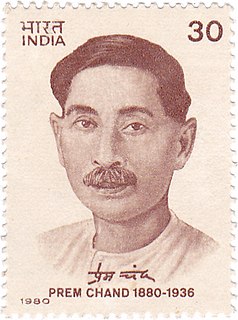A Quote by Munshi Premchand
I will not call that person happy who knows no rest because of his enemies, who is the butt of fun by all and for whom no one has any empathy, who is as if held on a leash by others, who has lost himself in hedonistic pursuits, who preys on those weaker to him and wags his tail for his superiors.
Related Quotes
Some souls think that the Holy Spirit is very far away, far, far, up above. Actually he is, we might say, the divine Person who is most closely present to the creature. He accompanies him everywhere. He penetrates him with himself. He calls him, he protects him. He makes of him his living temple. He defends him. He helps him. He guards him from all his enemies. He is closer to him than his own soul. All the good a soul accomplishes, it carries out under his inspiration, in his light, by his grace and his help.
No man, however enslaved to his appetites, or hurried by his passions, can, while he preserves his intellects unimpaired, please himself with promoting the corruption of others. He whose merit has enlarged his influence would surely wish to exert it for the benefit of mankind. Yet such will be the effect of his reputation, while he suffers himself to indulge in any favourite fault, that they who have no hope to reach his excellence will catch at his failings, and his virtues will be cited to justify the copiers of his vices.
How kind is our Sacramental Jesus! He welcomes you at any hour of the day or night. His Love never knows rest. He is always most gentle towards you. When you visit Him, He forgets your sins and speaks only of His joy, His tenderness, and His Love. By the reception He gives to you, one would think He has need of you to make Him happy.
The godly man contrarily is afraid of nothing; not of God, because he knows Him his best friend, and will not hurt him; not of Satan, because he cannot hurt him; not of afflictions, because he knows they come from a loving God, and end in his good; not of the creatures, since "the very stones in the field are in league with Him;" not of himself, since his conscience is at peace.
Shaytan will tell you that you’re not worthy, so give up. But his traps are based on lies. When was any of it because of *your* worth? It was all because of His mercy, His generosity, His love of giving, and forgiving. And those qualities don’t change because you’re messing up. Just seek them. Call Him by His mercy, not by your deeds.
Man... knows only when he is satisfied and when he suffers, and only his sufferings and his satisfactions instruct him concerning himself, teach him what to seek and what to avoid. For the rest, man is a confused creature; he knows not whence he comes or whither he goes, he knows little of the world, and above all, he knows little of himself.
At that instant he knew that all his doubts, even the impossibility of believing with his reason, of which he was aware in himself, did not in the least hinder his turning to God. All of that now floated out of his soul like dust. To whom was he to turn if not to Him in whose hands he felt himself, his soul, and his love?
How much reverence has a noble man for his enemies!--and such reverence is a bridge to love.--For he desires his enemy for himself, as his mark of distinction; he can endure no other enemy than one in whom there is nothing to despise and very much to honor! In contrast to this, picture "the enemy" as the man of ressentiment conceives him--and here precisely is his deed, his creation: he has conceived "the evil enemy," "the Evil One," and this in fact is his basic concept, from which he then evolves, as an afterthought and pendant, a "good one"--himself!
[S]uppose the mind of [a] friend of humanity were clouded over with his own grief, extinguishing all sympathetic participation in the fate of others; he still has the resources to be beneficent to those suffering distress, but the distress of others does not touch him because he is sufficiently busy with his own; and now, where no inclination any longer stimulates him to it, he tears himself out of his deadly insensibility and does the action without any inclination, solely from duty.
[T]he individual in whom the will for the light is strong and clear finds his heart inextricably bound up with the struggle of the forces of light in his native place and time. Much as he may long for the opportunity of fuller self- expression in a happier world, he knows that for him self-expression is impossible save in the world in which his mind is rooted. The individual in whom the will for the light is weak soon persuades himself that his opportunity lies elsewhere.
The master in the art of living makes little distinction between his work and his play, his labor and his leisure, his mind and his body, his information and his recreation, his love and his religion. He hardly knows which is which. He simply pursues his vision of excellence at whatever he does, leaving others to decide whether he is working or playing. To him he's always doing both.




































